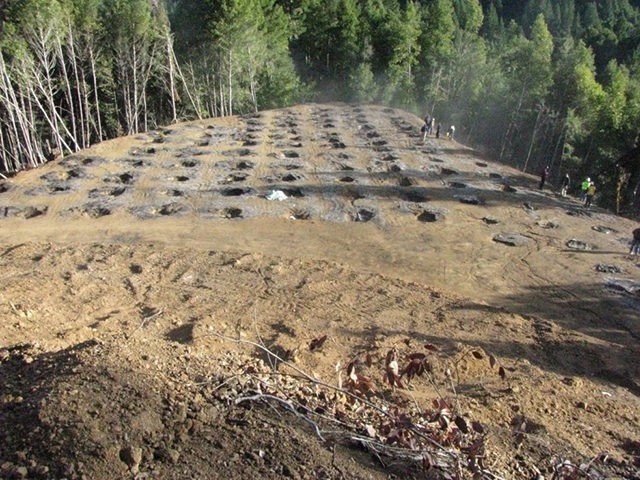Drug cartels are not only setting up huge marijuana farms on national forest lands in California, but they are also polluting the land and water with trash and toxic chemicals.
“The true crime here is the fact that they’re killing off basically America’s public lands, killing off the wildlife, killing off our water,” Kevin Mayer, a U.S. Forest Service law enforcement assistant special agent in charge, said. “This is stuff that, you know, it’s not gonna repair itself.”
A California public radio outlet reported that a coalition of environmentalists, law enforcement agents, politicians, and wildlife ecologists are trying to stop the drug operations and repair the damage:
Some in that coalition recently visited a site discovered deep in California’s Shasta-Trinity National Forest. They and a group of armed Forest Service agents made their way down a steep hillside above a creek on a warm fall day, through a tangle of Douglas fir and madrone trees and big leaf maples turned golden yellow. Finally, the forest gives way to a sprawling grow and camp site. It’s typical in shape: terraced plots carved erratically into a hillside scared [sic] by wildfire. The burned trees and new growth offer some cover from air surveillance. Two Mexican nationals were arrested at the site in September; they are suspected of being affiliates of a cartel.There’s some 3,000 pounds of trash here from discarded clothes and propane tanks to 3 miles of plastic irrigation pipes — an indication this site has likely been used for years. Most of it eventually will have to be hauled out by helicopter.
But while the trash can be removed, fighting chemical exposure is not an easy fix.
“This one is Bromethalin, which is a neurotoxin rodenticide,” wildlife ecologist Greta Wengert said, holding up an empty container used for rodent bait blocks.
“They also found a container of concentrated carbofuran, an insecticide banned by the Environmental Protection Agency. Carbofuran is produced in the U.S. by Pennsylvania-based FMC Corp, which exports the product to Mexico, India and other nations,” KVCR reported. “The European Union, Canada and Brazil have full bans on carbofuran.”
“It is incredibly toxic,” Wengert said. “A quarter teaspoon could kill a 600-pound black bear. So obviously just a tiny amount can kill a human. It remains in an ecosystem for a long period of time.”
“We have detected [carbofuran] in the soil, in cannabis plants, in native vegetation, the water, the infrastructure,” Wengert said.
The drug farmers use the chemicals to protect their crops from insects and rodents.
One of the animals affected is the reclusive Pacific fisher, a carnivore in the weasel family and a candidate for listing under the California Endangered Species Act.
“In Fishers, there is an in utero transfer and mother’s milk transfer as well,” Mourad Gabriel, a wildlife disease ecologist, said in the report. “The female is transferring that anticoagulant rodenticide to her fetuses or when she has birth and she gets exposed, she can transfer to that mother’s milk.”
“And when Fishers and other exposed wildlife die, for example, a whole host of animals and insects the feed on the carcass spreading the poisons further,” KVCR reported.
The report said the Forest Service in California average 220 drug site raids and eradication operations every year.
“On all lands in California — private, state and public — law enforcement seized more than $1.5 billion worth of illegal marijuana in fiscal 2019,” KVCR reported.
“Illegal cannabis grows are devastating our communities,” Attorney General Xavier Becerra said in a statement.
“Criminals who disregard life, poison our waters, damage our public lands, and weaponize the illegal cannabis black market will be brought to justice.”
Follow Penny Starr on Twitter.

COMMENTS
Please let us know if you're having issues with commenting.